The Rev. Adrienne Reedy was a seven-year-old girl at home waiting for her favorite show, “Bewitched,” to come on the TV the night that a news reporter interrupted to tell the nation that Martin Luther King had been shot and killed.
Her father was stoical, sitting up straight and “showing absolutely no emotion,” Reedy recalled Monday morning.
Her mom was out grocery shopping but when she came home “it was the complete opposite,” Reedy told more than 150 people gathered at United Methodist Church of New Canaan for an annual celebration of the life and legacy of the Rev. Dr. Martin Luther King Jr.
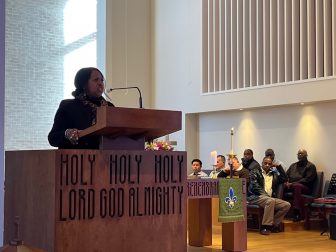
Guest speaker the Rev. Adrienne Reedy addresses those gathered at the 22nd Annual Celebration Service in Honor of the Life and Legacy of the Rev. Dr. Martin Luther King Jr., held Jan. 15, 2024 at the United Methodist Church of New Canaan. Credit: Michael Dinan
“She was frantically crying as she busted through the door shouting, ‘Calvin! Oh Lord, no! They’ve killed him! They killed Martin Luther King! Calvin! What are we going to do? God, no. No! No! They killed him!’ The phone began ringing. Family members are calling and members from our church are calling. My mom’s eyes could barely open, they were swollen and puffy from all the tears. I sat there feeling guilty for being annoyed that my TV show was canceled. Right then, I remember beginning to think that Martin Luther King, he must be a member of my family. Seriously. I thought he was like an uncle I didn’t know or a long distant cousin, because of the impact that he had in my household that night and the days to come.”
Reedy realized that she wanted to know more about King, and she read his “I Have a Dream” speech. And one of the most memorable passages for her was when King said, “I have a dream that my four little children will one day live in a nation where they will not be judged by the color of their skin, but by the content of their character.”
Never forgetting those words, Reedy grew up and learned about King’s life and his death.
“Now on the surface things were appearing to go well in my own life, being able to go in and out of racial circles and being what I consider myself as a boundary crosser,” she told those gathered in the church. “I’ve experienced this nation’s progress in that sense. But with the increase in racial polarization rising in our country, racial tensions that are so prevalent throughout, to say I’m ‘concerned’ is an understatement. I have a rising concern for dreams that I’ve been holding for my own three sons: To simply be judged by the content of their character. Looking back, understanding all too well why mom was crying so hard.”
A recording gospel artist/singer and songwriter, worship leader and speaker who serves on the Police Commission in Wilton and on the board of Cornelius Corps, Reedy was the keynote speaker at the 22nd annual celebration of King’s life and legacy, organized by the Interfaith Council of New Canaan.
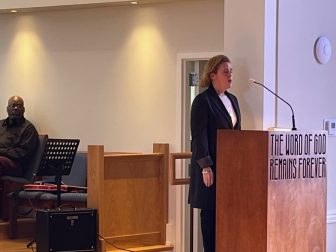
Jen Zonis, Interfaith Council of Canaan board president, sings a prayer for peace at the 22nd Annual Celebration Service in Honor of the Life and Legacy of the Rev. Dr. Martin Luther King Jr., held Jan. 15, 2024 at the United Methodist Church of New Canaan. Credit: Michael Dinan
It featured a processional and additional musical selections from the Pivot Ministries men’s choir, a welcome from the Rev. Gilbert Burgess of the Community Baptist Church, invocation from the Rev. Scott Herr of First Presbyterian Church of New Canaan, Interfaith Prayer for Peace from Jen Zonis, board president of the Interfaith Council, an offertory introduced by Morgan Edwards, the Interfaith Council’s treasurer, collected by ushers from the Congregational Church of New Canaan’s youth program, “Lift Every Voice and Sing” and “Stand Up” sung by Khanisha Moore, accompanied by Peterson Prime and Justin Merveille, a benediction led by the Pastor Richard Williams of Pivot Ministries. Those in attendance included First Selectman Dionna Carlson, local pastors, nonprofit leaders and members of volunteer boards and commissions in town.
The celebration also featured remarks from Dariel Ortiz, a New Canaan High School freshman and scholar at A Better Chance or “ABC” of New Canaan, an impactful and widely respected nonprofit organization that marks 50 years in town this year.
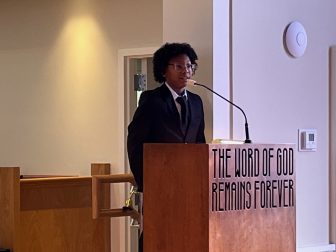
NCHS freshman and ABC scholar Dariel Ortiz offers testimony at the 22nd Annual Celebration Service in Honor of the Life and Legacy of the Rev. Dr. Martin Luther King Jr., held Jan. 15, 2024 at the United Methodist Church of New Canaan. Credit: Michael Dinan
Ortiz quoted from a King sermon that Reedy herself also discussed at length during her own stirring keynote address: “True peace is not just the absence of tension, but the presence of justice.”
Peace “transcends higher than mere tranquility,” Ortiz said. “It emphasizes the establishment of fairness in our society.”
He continued, “The significance this quote holds for me goes beyond the avoidance of conflicts. It’s a directive to take the first step into action, prompting us to address unfairness from the roots, not on its surface level. Remaining passive is insufficient. We must articulate our opposition to injustice. Whether at school, at a job, or anywhere else in the future, we must aspire to advocate for fairness.”
Ortiz said he is committed to the principle of “advocating for equitable treatment.”
“I want to ensure that everyone around me receives fair opportunities, regardless of their background,” he continued. “Furthermore, I aim to create an understanding of many diverse and unique perspectives, acknowledging that justice and equality includes a range of perspectives. Embracing this quote means actively promoting justice in both significant moments and everyday choices. It involves a thoughtful consideration of the consequences of my actions on others and a dedication to fostering a society marked by fairness and justice. Let’s bear in mind that true peace materializes when each of us contributes to constructing a just world.”
Reedy thanked Ortiz for quoting from a sermon that King delivered in March of 1956, called “When Peace Becomes Obnoxious.”
She noted that her own parents have been gone for more than 20 years and that she’s “glad that they did not have to witness each time we have taken steps backwards in our nation.”
“If they were here today, I am so sure I would hear my mother crying, crying and crying,” Reedy said. “Both of my parents would be deeply troubled, but at the same time, they would be working to make the dream a reality. They would be pleased with the work both my husband and I are doing at Cornelius Corps, journeying with people in the faith community and beyond. And today, as I reflect on what this day represents, I want to thank Dr. King for thinking beyond himself and including me.”
She turned to look at Ortiz, who sat with fellow ABC scholars in the second row of pews.
“Young man, thank you,” Reedy said. “Thank you so much. Because that quote is what I want to talk about, how that quote even came into existence.”
The sermon that King delivered “was in response to the expulsion of a black woman by the name of Artherine Lucy,” Reedy said.
“After being denied admission to the University of Alabama because of the color of her skin, her case went to federal court and in 1955 the University of Alabama could no longer deny admission based on race. So on February 6th, 1956, Miss Lucy was able to start classes at the University of Alabama. But you can imagine she was met by a crowd of classmates and a mob of people who didn’t even go to that school. She was met with those people filled with hate. Now because of the verbal threats and even physical abuse, the police—get this—the police had to escort her from class to class. The mob had gotten so out of control that the police had to remove her from the campus. On the third day, Artherine Lucy was asked to leave the school by the president of the university and board of trustees, for her own safety and, of course, for the safety of the university. The day after her dismissal, the headlines in the newspapers the next day were praising the university for how ‘peace’ had made its way back to the university’s campus.”
The notion that “peace” had returned following Lucy’s ouster “sickened” King, Reedy said.
She quoted extensively from the sermon:
“Yes, things are quiet in Tuscaloosa. Yes, there was peace on the campus. But it was peace at a great price. It was peace that had been purchased at an exorbitant price, of an inept trustee board succumbing to the whims of a vicious mob. It was peace that had been purchased at the price of allowing mobocracy to reign supreme over democracy. It was peace that had been purchased at the price of capitulating to the force of darkness. This is the type of peace that all men of goodwill hate. It is the type of peace that is obnoxious. It is the type of peace that stinks in the nostrils of the almighty God. Now let me hasten to say that this is not a concession to or a justification of physical war. And I can see no moral justification for that type of war. I believe absolutely and positively that violence is self-defeating. War is devastating. And we know now that if we continue to use these weapons of destruction, our civilization will be plunged across the abyss of destruction. However, this is the type of war that every Christian is involved in. It is a spiritual war. It is a war of ideas. Every true Christian is a fighting pacifist. In a very profound passage, which has been often misunderstood, Jesus utters this, He says, ‘Think not that I am come to bring peace, I come not to bring peace, but a sword.’ Certainly He is not saying that He comes not to bring peace in the higher sense. What He is saying is, ‘I come not to bring this peace of escapism. This peace that fails to confront the real issues of life. The peace that makes for stagnant complacency.’ Then He says, ‘I come to bring a sword.’ Not a physical sword. Whenever I come, the conflict is precipitated between the old and the new. Between justice and injustice. Between the forces of light and the forces of darkness. I come to declare war over injustices. I come to declare war on evil. Peace is not merely the absence of some negative force, some negative forceful tension, confusion, but it is the presence of some positive force. Justice, goodwill and the power of the kingdom of God.”
Reedy, whose own address was titled “The Presence of Justice,” quoted King on the difference between increased tension in Alabama and the presence of justice.
“Even if we didn’t have this tension, we still wouldn’t have positive peace,” she quoted. “Yes, it is true that if the Negro accepts his place, accepts exploitation and injustice, there will be peace. But it would be a peace boiled down to stagnant complacency, deadened passivity. And if peace means this, I don’t want peace. If peace means accepting second class citizenship, I don’t want it. If peace means keeping my mouth shut in the midst of injustice and evil, I don’t want it. And if peace means being complacently adjusted to a deadly status quo, I don’t want that peace. And if peace means a willingness to be exploited economically, dominated, politically humiliated, and segregated, I don’t want peace. So in a passive, non violent manner, we must revolt against this peace. Jesus says in substance, I will not be content until justice, goodwill, brotherhood, love, yes, the kingdom of God are established upon the earth. And this is real peace. A peace embodied with the presence of positive good. The inner peace that comes as a result of doing God’s will.”
Reedy said she loved how King “calls people back then and even now for a deep level of consciousness that continues to seek justice for all.”
“This is why my mom and so many in our family circle were so distraught when he was taken away,” she said. “This gift, to be able to reach into the souls of people by refusing to let people off the hook who claim their allegiance to the Constitution or to the loving God and the interpretation of Scripture and what it has to say about loving our neighbor. Yes, loving our neighbors as ourselves. It’s obvious to me that there are many people who don’t love themselves nor God, making it very difficult to love and to see the image of God in each person. But it’s necessary in continuing the work. We must look to reframe our moral consciousness. How we look at one another, how we are so dismissive of one another, how we decide who is worthy of life, who is worthy of clean water, who is worthy of a decent education.”
Reedy said she’s been part of the annual celebration of King in New Canaan for many years “and I always look forward to the contributions of our young participants.”
“The ABC scholars, year after year, you touch my heart, because I know that when we have our young people involved, seeds are not only being planted, seeds are being watered in the lives of our young people,” she said. “And when we do events like this, it allows our young people to see that there are people who are concerned about the issues at hand.”
Reedy said we are now living in “some trying times.”
“When you hear about people wanting to not deal with history, take a look at history,” she said. “I’m curious, how many of you people today, right now, know the story about Autherine Lucy? Raise your hand for me.”
Four people raised their hands, Reedy noted.
“We have work to do,” she said. “And the work that we have to do is not to not be able to talk about it, or not to address it. That’s not the work. That’s not the peace, that’s not the justice that we’re looking for. The peace and the justice comes when we can be truthful about our history. So that we know where we’ve been, so we can know where we’re going. This is a call for the interfaith community. This is a call for our selectwomen. Be in it for the real purpose of the call. We have work to do, and we’re not going to do it by glossing over it and watering it down. The work that we have to do is that we have to be honest, we have to be truthful. Then we can come together and love one another in the way God is calling us to love. That’s what this day represents. That’s who Martin Luther King represents to me.”
Reedy received a rousing ovation for her address.
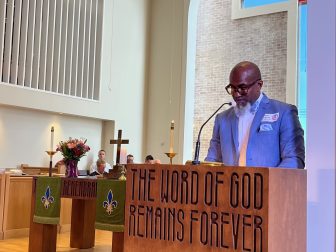
The Rev. Gilbert Burgess of the Community Baptist Church delivers a message of welcome at the 22nd Annual Celebration Service in Honor of the Life and Legacy of the Rev. Dr. Martin Luther King Jr., held Jan. 15, 2024 at the United Methodist Church of New Canaan. Credit: Michael Dinan
Burgess in welcoming attendees to the celebration noted that “MLK Day is the only federal holiday designed as a national day of service to encourage all Americans to volunteer, to improve their communities.”
“This year, because of so many disparages with food and a lack of homes for those less fortunate, we are asking that you make a donation to the Food Bank of Lower Fairfield County,” he said.
Herr during the invocation noted that the celebration is not only to remember King and his work, “but even more importantly, we are here to share and rekindle his prophetic vision to pursue a better life and a fairer world for all people. The vision of the beloved community.”
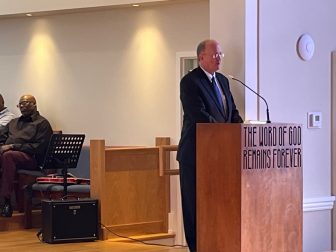
The Rev. Scott Herr of First Presbyterian Church in New Canaan delivers the invocation at the 22nd Annual Celebration Service in Honor of the Life and Legacy of the Rev. Dr. Martin Luther King Jr., held Jan. 15, 2024 at the United Methodist Church of New Canaan. Credit: Michael Dinan
Herr cited philosophers throughout history who have acknowledged that they’re divided within themselves.
“There’s a tension at the heart of our human nature, and whenever we set out to dream our dreams and build our temples, we must be honest enough to recognize it,” Herr said. “And so we pray, come Holy Spirit, be our spirit here. Convict our heart and steel our resolve as your beloved community, that we might dream again and live into a world where there is liberty and justice, where there is compassion and peace for all. In your most holy name we pray, amen.”

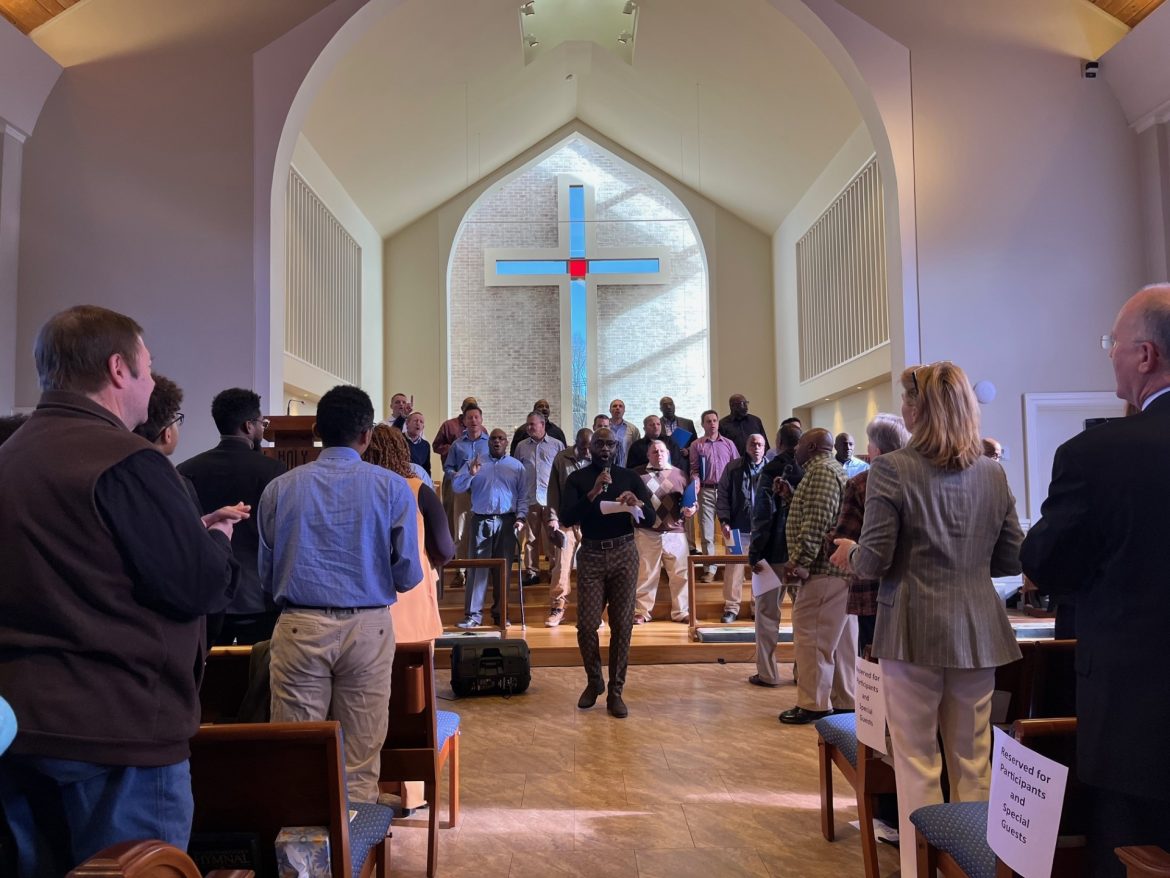
Thank you for your coverage of this event. It was a privilege to hear Rev. Reedy – her personal remembrance of the assassination of Dr. King, her honesty and her call to action. Thank you to the Interfaith Council, incredible musicians – Ms. Moore (INCREDIBLE), the ABC House – leadership and scholars, Pivot Ministries, student musicians, faith leaders, and the Methodist Church for hosting all of us.
wonderful article, Michael. Thank you. One more person to thank is Marla Chisholm, with the Methodist Church, who did much of the planning and preparation work for the service,
Marla Chisholm was terrific! She gave a beautiful introduction of Rev. Reedy. I hope I have a chance to thank her for the event in person sometime soon!
“I have a dream that my four little children will one day live in a nation where they will not be judged by the color of their skin, but by the content of their character.” –Martin Luther King
If we can agree that honesty is important, then let’s be honest. Today’s social justice movement contends that race is essential to one’s character rather than incidental to it, that equal outcomes are the goal rather than equal opportunities, that diversity is more important than merit.
Perhaps our current racial polarization wouldn’t be so extreme if activists, and corporate media, weren’t so committed to perverting MLK’s dream.
Sorry for bothering with the details.
Mr. Taylor, I highly suggest you read the rest of Dr King’s “I Have A Dream” speech vs cherry-picking a favorite, misused quote. You will find your interpretation isn’t as honest as you’ve somehow been led to believe. Dr King’s wife, Coretta, and daughter Bernice, have both expressed vexation at those who remove that quote from its larger content and meaning and misinterpret Dr King’s original intent, as you’ve done here. The “I Have A Dream” speech is powerful and moving and worth studying in depth, especially by those people and political organizations that opt to water down its meaning by highlighting a single sentence for their own gain. This is not how we are meant to honor the legacy of an American hero such as Dr King.
Monica:
The quote was taken from Reverend Reedy and the article above.
It’s a famous quote because its simplicity and clarity doesn’t require interpretation. The idea expressed in the quote directly contradicts racial essentialism, which is what’s being advocated today. Maybe the people who are coercing others into a different set of ideas can benefit by going back and re-reading the speech and the quote. Alternatively, you could stand for what you believe in, rather than honor Dr. King.
Also forgot to mention this was an absolutely fantastic article, Mike. I wasn’t able to attend the service but your coverage of the event made me feel as though I was present. It seemed like a wonderful event. Thank you for this excellent piece and kudos to our InterFaith community leaders for bringing this to life. What a proud and inspiring moment for New Canaan.
Thank you!
I concur! Thank you, Mike.
Thank you, Mike, for this wonderful article about the Interfaith Council of New Canaan’s 22nd annual service to honor the life and legacy of Martin Luther King, Jr. As speaker Rev. Adrienne Reedy said, we are still trying to put into practice (in 2024) the goals King put forth (in 1964). The article in the New Canaanite captured the essence of the speakers and the musicians, and the service highlighted the diversity and racial justice/reconciliation both present and needed in our community and in our country.